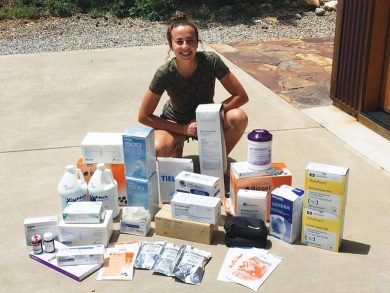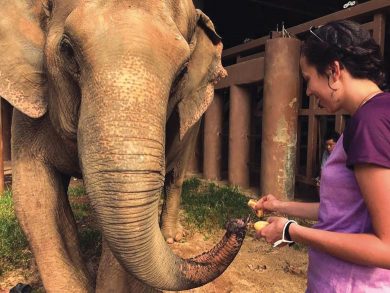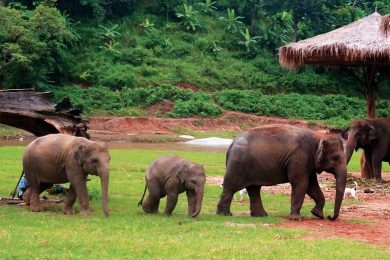
When the plane finally landed, we exited into the steamy, humid air. My droopy eyes could tell this experience would be something totally new. My sister and I had travelled from our small hometown in Colorado, where the air is too thick to breathe and the mountains rise high around each crack of the town. After thirty hours in airports and planes, we had reached Thailand, where we would be experiencing a new culture, climate, and an eye-opening volunteer project for the next two weeks. Exhausted, we longed for a good night’s sleep in a cool, air-conditioned hotel room with a cosy bed; however, that is far from what we got.
As we drove to the Elephant Park, tall green trees rose on each side of the narrow dirt path. Small villages lined the side of the road, and busy people walked along caring for the children and animals around them and preparing for nightfall. Finally, the bus stopped and we were taken to our room: a tiny room with four small beds, two unknown roommates, and large mosquito netting around each bed to keep off the bugs as we slept. The windows were just holes along each wall, looking out onto the reserve. I could tell by my sister’s eyes that we were both thinking the same thing: what had we gotten ourselves into?
Too tired to talk to the people who would be sharing our room, we both climbed into our mosquito nets, but sleep didn’t come. I could hear exotic bugs buzzing outside the windows and in the room. I could even hear the powerful elephants rumbling and calling one another not too far away. I was nervous and excited. Once I started to hear dogs barking in the distance, I knew sunrise was coming soon.
I could not wait to experience firsthand the reason I had travelled all this way: to work with the beautiful and nearly extinct animal, the elephant.
Once a pink light started seeping in the windows, the dogs were barking without rest. I called to my sister, who also hadn’t slept, and we went to breakfast. Over fried rice and instant coffee, we watched the mist rising off the mountains and looked at families of elephants wandering across the reserve. I had come to the Elephant Park to donate medical supplies and work on partnering in distributing donated medical supplies throughout Asia, but I was looking forward to spending a week working with the elephants.

The week was full of beauty: learning how the park had gone from just four elephants hidden in the forest to huge sanctuaries in three countries, feeding a rescued elephant hand cut watermelons, bathing an injured elephant in the river, walking a three-legged dog who had been rescued from being sold for meat, meeting volunteers from all over the world … the memorable moments came one after another. But my time at the park also meant learning the truth about elephant conservation.
Many tourists coming to Thailand dream of riding an elephant. I will admit, it looks exotic and magical, and if I hadn’t learned what’s behind training an elephant to be ridden. In order for an elephant to be able to safely transport people on its back, it must be trained to fear injury. This means baby elephants are taken from their mothers at a young age and put through the pajaan, a breaking process that includes trapping the elephant in a small cage and injuring it with rocks, sticks, nails, and knives until it follows commands.
For elephants to be kept docile, they must be kept afraid. And for animals as smart and caring as these, who know and miss and mourn their families and who crave familial relationships, mental stimulation, and companionship, the results are tragic. Fortunately, most people who want to ride an elephant or watch it paint feel that way because they love elephants. For that reason, education is the solution: if those people understand that the elephants will suffer because of that ride or painting, they may opt for a more humane solution. So as we continue to spread the word, the elephant tourism industry changes, and there is hope for these brave and beautiful creatures.
As a visitor to Thailand, it was hard for me to understand how the Thai people could love elephants but also exploit them. I realised that it’s easy to see hypocrisy in other cultures but hard to see it in our own. So I tried to look from the perspective of a Thai person. If training an elephant meant that I could feed my family and send my child to school, would I do it? Probably. By putting aside my initial judgements, I was able to listen. I believe this is how travel helps us to find real solutions: listening to the people involved and finding out what motivates them.
My time with the elephants was amazing. It’s caused me to give one piece of advice: before you travel, get informed! Spending an afternoon researching is better than regretting your uninformed Instagram photos when you get home. You can have an ethical experience and an amazing time. I didn’t ride an elephant, but I got to look one deep in the eye. I heard one crush a pumpkin in her strong jaws. I stood in the cold river and bathed a baby elephant. I rode a truck through a lush, green forest in the rain to cut elephants food.

I got to see elephants up close and watch them interact with their families, playing and almost laughing together. These amazing experiences will stay with me forever, and I never have to regret them or feel for pain that they caused. My experience in Thailand will stay with me forever because travel imprints on you in a way that nothing else can, and I am glad that it imprinted something I can teach: if you love elephants, don’t ride them!

